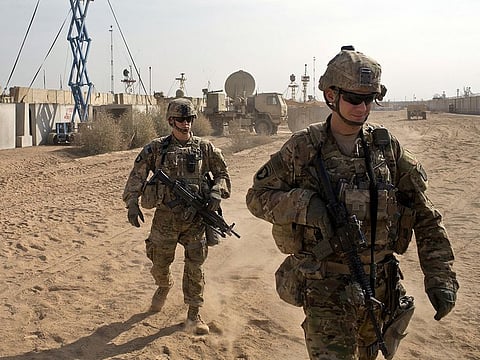20 years after the Iraq War, consequences still felt
The war led to countless deaths and destroyed the social and ethnic fabric of the country

Charles de Talleyrand, the 19th Century French statesman, wit and scion of an ancient aristocratic family, was known for his crafty and often cynical maxims.
In 1804, reacting to the sham trial and the execution, on orders issued by Napoleon, of a counter-revolutionary duke, quipped: "Sir, this is worse than a crime, it's a mistake". (Monsieur, c'est pire qu'un crime, c'est une faut.)
As we reflect, in the cold light of hindsight, the 20th anniversary of the Iraq war, we find ourselves tempted to subvert Talleyrand's quip and say that America's catastrophic military intervention in that ancient land was not a mistake so much as it was a crime.
Exactly twenty years when American forces launched their invasion -- which was preceded by a relentless bombing campaign meant to "shock and awe" Iraqis -- the scars left by that invasion remain etched on the consciousness of the country's body politic, and the searing wounds it inflicted on its people remain unhealed.
Also Read: 20 Years Later: The legacy of the Iraq War
Mission Accomplished
The US, then assuming the role of the big gun running the world, was convinced that its mission to "seek and destroy" what turned out to be phantom weapons of mass destruction hidden in the country, and that its harebrained scheme to transform Iraq into a Jeffersonian democracy would be a "cakewalk".
And it was equally convinced that the mission would be accomplished at such lightning speed that its critics would not have the time to cry foul.
Indeed, on May 1, 2003, a mere six weeks after the invasion, as we all so well recall, then President George W. Bush, arguably the most powerful man in the world, mounted a podium on the aircraft carrier USS Abraham Lincoln, in front of a White House-designed banner that proudly said "Mission Accomplished", and, reading from a prepared speech, declared: "Major combat operations in Iraq have now ended".
An unnecessary, unjustifiable war
That Bush, as commander-in-chief of the US armed forces was dissed by the mainstream media after it became clear in later months that the mission was mockingly remote from anywhere near being accomplished, was laughable where it was not hypocritical.
That is so because that very same media, including the influential New York Times and the Washington Post, was complicit in bringing about the mess, given the fact that its editorialists were beating the drums of war from the outset.
That war, as we knew then and as we know now, was promoted by the since discredited neocons, who were active in and outside the administration, a cabal of reactionary conservatives who advocated interventionism in international affairs, including use of the so-called "peace through strength" approach -- a strategy adopted in history by hawks all the way from Roman Emperor Hadrian to American president Ronald Reagan -- that implies that "peace" can be achieved through the application of military power.
But as it turned out, the geopolitical ambitions of these hapless planners of the war far exceeded their grasp of the complex forces that made this very, very ancient land tick -- a land so ancient it traces its own name back to the Sumerian city of Uruk, which thrived in the mid-4th millennium BC.
Thus, one of the many unintended consequences of the war was the unleashing of a Pandora's Box of cultural, social, ethnic, sectarian and tribal contradictions that had remained dormant for generations -- leading in turn to all hell breaking loose.
The US government has calculated exactly the number of casualties it suffered in that war: As many as 4,552 service members and 3,793 military contractors died between March 2003 and October 2018. But it has not taken the trouble to calculate the exact or even the rough number of Iraqis killed during that time.
The estimate is that the number of deaths runs into the hundreds of thousands, though according to Brown University's Cost of War Project, about 300,000 lost their lives -- which translates to sundry members of 300,000 Iraqi families visiting cemeteries every now and again to lay flowers and recite the fatiha at the gravestones of loved ones who had died unnecessarily in an unnecessary war.
And what was it all for?
The answer to that may be found in the twisted logic of American military culture, which is itself the product of a peculiar social culture propelled by the need to "conquer space", "tame nature" and "kill time".
Call it the Ben Tree Complex.
On February 7, 1968, during the Tet Offensive that year, American bombs and rockets destroyed the Vietnamese town of Ben Tree, killing hundreds of civilians. Later that day, an unidentified military commander gave the AP reporter Peter Arnnett a memorable explanation for the destruction of the placid river town. The explanation, which Arnnette used as the lead for his dispatch, was this: "It became necessary to destroy the town in order to save it".
Twenty years ago this month, US military forces went to Iraq -- let's recall, without being invited -- ostensibly to save it from a ruler who tyrannized its people, and in order to do that they found it necessary to destroy the country first.
Don't rack your brains over what all this means. The logic that animates the moral pretensions of Pax Americana's foreign policy is too twisted for humble folks like you and me to comprehend.
Fawaz Turki is a noted journalist, academic and author based in Washington. He is the author of The Disinherited: Journal of a Palestinian Exile.


